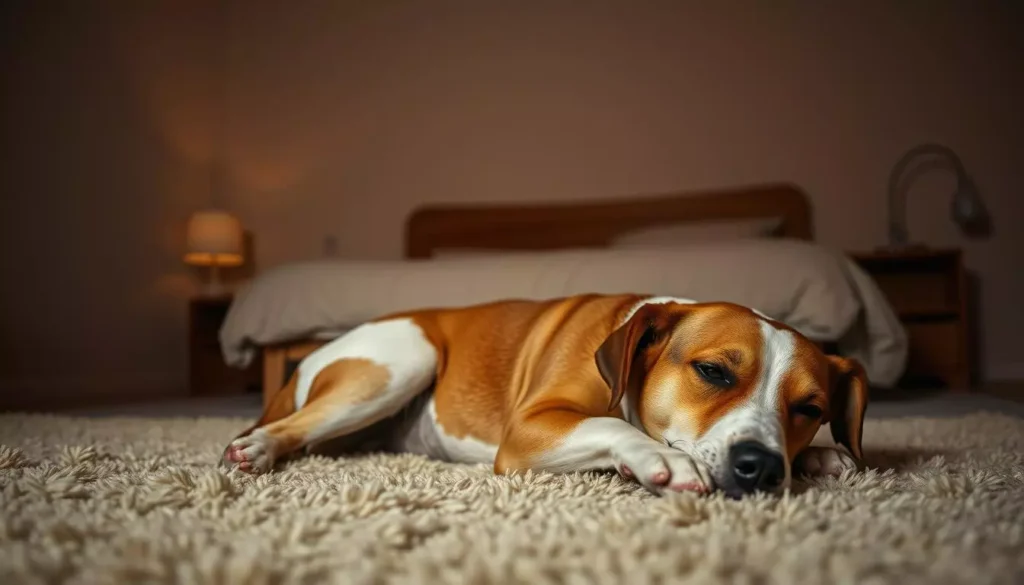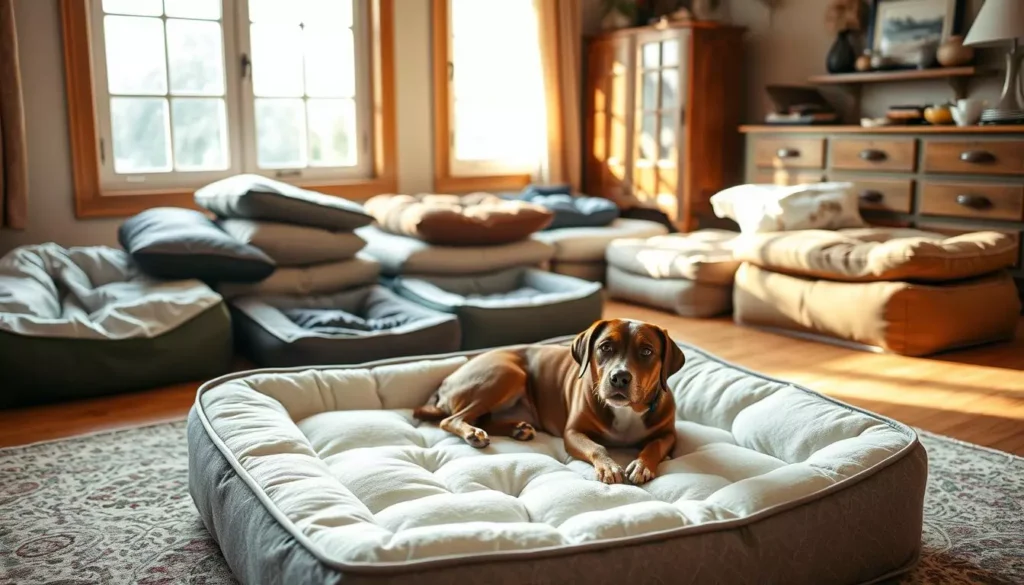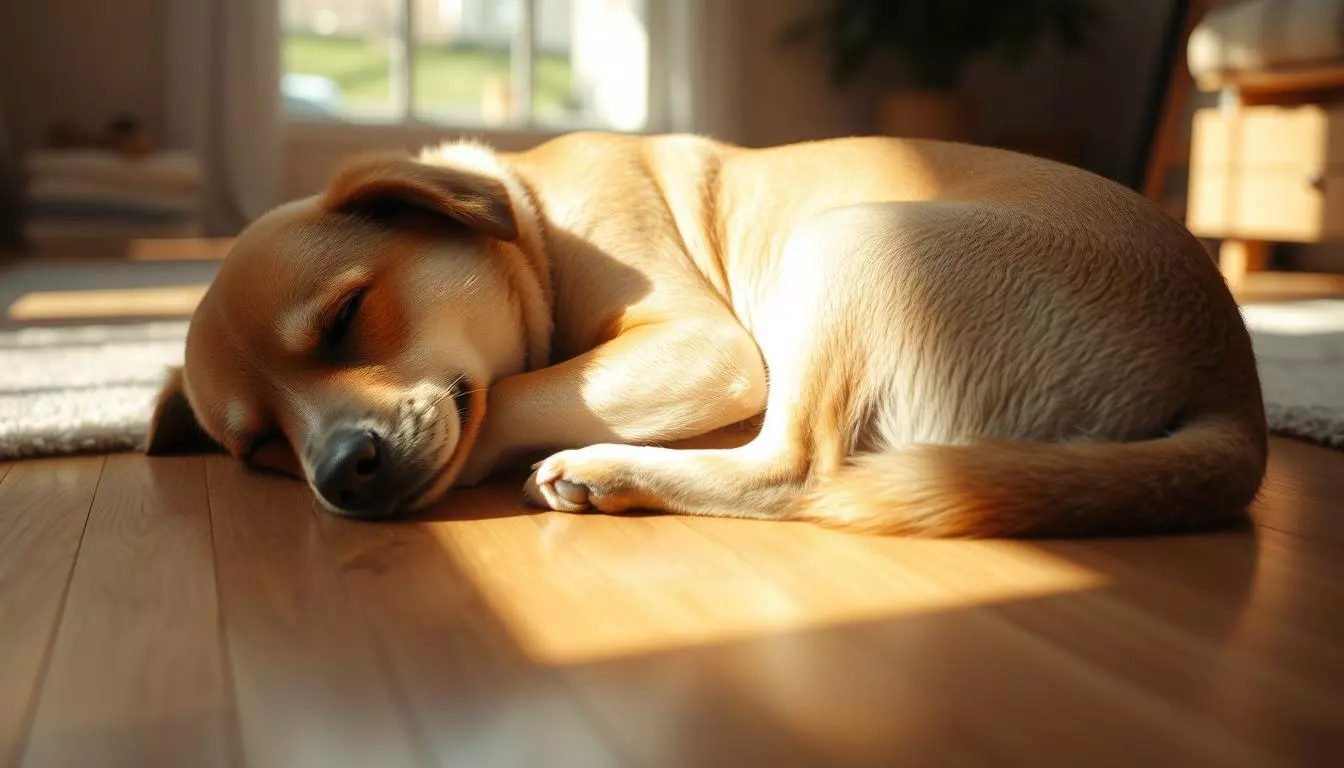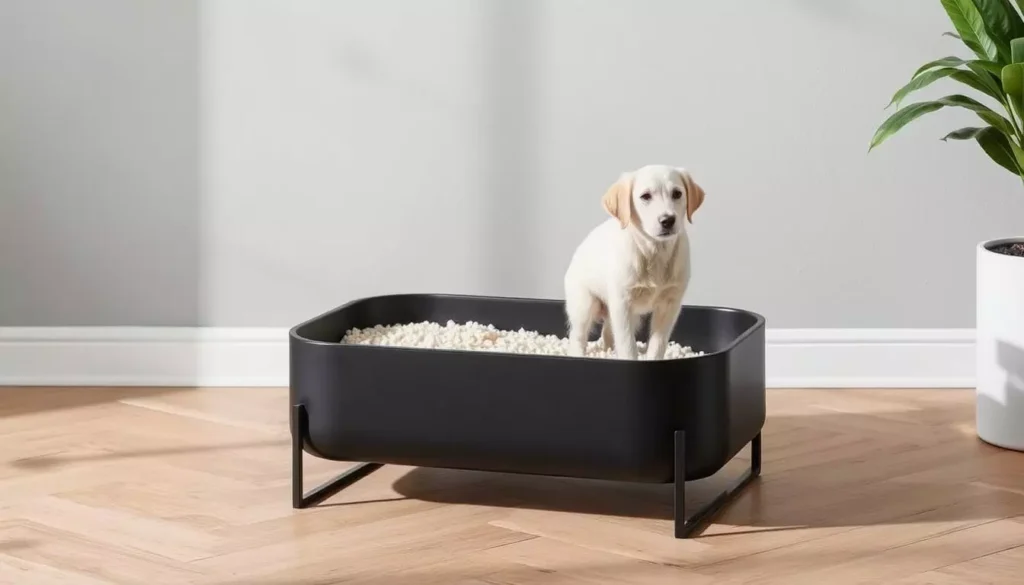Watching my dog sleep on the floor is both sweet and puzzling. It's hard to understand why he prefers the cold, hard floor over his cozy bed. As I sit on the couch, I often wonder why he makes this choice.
Many dog owners, like me, have the same question. We realize that our pets have their own sleeping preferences. In this article, we'll explore why dogs might choose to sleep on the floor. We'll look into what makes them feel comfortable.
Key Takeaways
- Understanding your dog's sleeping preferences can enhance their comfort.
- Dogs may prefer sleeping on the floor due to temperature regulation.
- Hard surfaces can provide a sense of security for some dogs.
- Environmental factors greatly influence where your dog chooses to sleep.
- Health concerns may affect your dog's sleeping habits.
Understanding Dog Sleeping Preferences
Dogs sleep in ways that are shaped by comfort, habit, and their environment. They look for the perfect spot to rest, just like humans do. Some dogs like to be close to their owners, while others prefer to be alone.
What a dog chooses to sleep on can tell us a lot about them. Some dogs like soft beds, while others prefer the cool floor. Knowing why dogs sleep on the floor can help us understand them better. It can also make our bond stronger and help them sleep better.
As pet owners, we need to understand our dogs' needs and habits. Watching how they sleep can help us know what makes them comfortable. Every dog is different, so it's important to notice their unique sleeping styles.
Common Places Dogs Choose to Sleep
Dogs have their own favorite places to sleep. My pet likes different spots for different reasons. The usual dog bed isn't the only choice.
Many dogs like to sleep in their owner's bed. It's warm and makes them feel safe. Sometimes, my dog picks the couch or a favorite chair. These spots are cozy and comfortable.
Dogs also like to sleep on the floor. Why dogs sleep on the floor is interesting. The floor is cooler and firmer, which dogs find nice, especially when it's hot. It shows how each dog has their own sleep preferences.
Dogs' sleep spots show their personality and needs. Watching where my dog sleeps helps me understand what makes them feel good and safe.
The Comfort Factor: Are Dogs Comfortable Sleeping on the Floor?
Many pet owners ask, are dogs comfortable sleeping on the floor? Some dogs like the firmness of hard surfaces better than soft dog beds. The floor is great for dogs who like to stretch out and have their own space.
Sleeping on the floor can ease pressure points for dogs. This is good for dogs with joint issues. The cooler ground also helps keep their body temperature down, especially in warm weather.
But, sleeping on hard surfaces all the time might not be good for dogs. It could cause discomfort or health problems. I need to watch my dog's behavior and change things if they seem uncomfortable. If my dog shows signs of discomfort, a good dog bed might be the solution.

| Advantages | Disadvantages |
|---|---|
| Offers firmness that some dogs enjoy | May lead to discomfort over time |
| Relieves pressure points for dogs with joint issues | Can cause health problems if used exclusively |
| Helps regulate temperature for some breeds | Less cushioned than a dog bed |
Why Does My Dog Prefer to Sleep on the Floor?
As a dog owner, I often wonder why my dog likes sleeping on the floor instead of his cozy bed. There are many reasons for this preference. Dogs have unique instincts and needs that guide their sleeping habits. Let's look at some reasons why my dog might prefer the floor as his favorite sleeping spot.
Temperature Regulation
Temperature regulation is key for a dog's comfort. Many dogs seek cooler surfaces, especially in warm months. The floor can be a cool contrast to the heat. This helps them keep their body temperature just right for a good sleep.
Preference for Hard Surfaces
Dogs find comfort in hard surfaces due to their instincts. This behavior comes from a need for protection and stability. The solid ground makes my dog feel secure while sleeping. It lets him stay grounded and aware of his surroundings, perfect for relaxation.
Feeling Safe and Secure
Feeling safe is a big part of my dog's sleep habits. Many dogs, including mine, sleep better near their owners or in familiar places. Sleeping on the floor near me makes him feel secure, leading to a good night's sleep. This shows how important companionship and environment are for a dog's sleep.
Why Dogs Sometimes Avoid Their Beds
It's important for pet owners to understand why dogs might not want to sleep in their beds. One main reason is the size and fit of the bed. If it's too small or too big, it can be uncomfortable for them. Dogs might prefer a harder surface if their bed doesn't support them right.
Size and Fit of the Bed
A bed that doesn't fit well can cause many problems. For example:
- Small beds can make a bigger dog feel cramped, stopping them from moving and stretching freely.
- Oversized beds can make dogs feel uneasy, as they might have trouble finding a cozy spot.
Fixing these size issues can really help a dog feel more comfortable in their bed.
Discomfort and Pain Issues
Discomfort and pain are also big factors. Older dogs or those with arthritis might find their beds make things worse. They might choose harder surfaces for more support. Signs of discomfort and pain include:
- Having trouble getting up or lying down
- Changes in how they move
- Not wanting to jump into their bed
Pain can make a dog's bed seem less appealing, leading them to sleep on the floor instead. Making sure my dog's bed is soft but supportive can help with these issues.
Examining Your Dog's Sleeping Style
Understanding your dog's sleeping style can reveal a lot. Some dogs stretch out, while others curl up for warmth and security. These actions often show their natural instincts.
A dog curling up might feel vulnerable or just want to stay warm. It's fascinating to see how they adapt to their environment.
I often wonder, why does my dog sleep at my feet? It shows their trust and bond with me. Dogs feel safe near their owners but still sleep how they like.
Offering different places to sleep can make them more comfortable. This can help them rest better.

Environmental Factors Influencing Dog Sleep
The environment greatly affects where dogs sleep. Dogs often choose spots that feel right to them. Knowing the best place for a dog bed can really help your dog sleep better.
Location of the Dog Bed
The dog bed location importance is huge. If the bed is too far from family or feels lonely, dogs might sleep elsewhere. Dogs like to be close to their owners, feeling safe and comfortable.
It's key to pick a spot where your dog feels most relaxed. This makes a big difference in their sleep.
Air Flow and Temperature
Other environmental factors affecting dog sleep include air flow and temperature. Good air flow keeps your dog's body temperature just right. This is important in both hot and cold weather.
But, a bed in a drafty spot or near windows can be uncomfortable. This might make your dog look for a better place to sleep. A cozy, balanced temperature spot is best for your dog's sleep.
The Impact of Age on Sleeping Preferences
Watching my dog grow older, I've seen big changes in how he sleeps. As dogs get older, their sleep needs change a lot. They start to prefer softer, more supportive places to rest.
This change is key to helping them feel better. Many older dogs have joint pain or discomfort. Softer beds can help ease these issues.
For better comfort, it's smart to get dog beds made for senior pets. These beds have extra cushioning and support. It's important for older dogs' bodies.
By paying attention to these changes, I can make my dog's sleep space better. This makes him happier and more comfortable.
It's also important to keep an eye on my dog's sleep area. A quiet, distraction-free space helps him sleep better. Understanding these changes helps me take care of my pet better.
Possible Health Issues Affecting Sleep Behavior
Watching my dog sleep, I see how health issues can change their habits. Conditions like arthritis or hip dysplasia make them choose softer surfaces. They might avoid their bed for a cooler or harder place.
Neurological problems can also mess with their sleep. My dog might feel restless and change where they sleep often. It's important to notice any changes in their sleep patterns.
Regular vet visits are key to catching health problems early. A vet can check if my dog's sleep habits are due to a hidden issue. Taking care of my dog's health helps them feel better and more comfortable.
| Health Issue | Effects on Sleep Behavior |
|---|---|
| Arthritis | Seeks hard or cool surfaces for comfort |
| Hip Dysplasia | Avoids elevated beds, prefers flat surfaces |
| Neurological Disorders | Restlessness, difficulty finding a comfortable position |
| Anxiety | May prefer to sleep near their owner for security |
Why Dogs Sleep Next to the Bed
Many pet owners wonder, "why does my dog sleep next to my bed?" This is a common question. Dogs sleep next to their owners because of their instinct to feel safe and to be with their pack. They watch over their humans and feel protected too.
Dogs want to be close to their owners because it shows a strong bond. As pack animals, they need social connections. Sleeping next to us makes them feel part of the family, even when we're asleep. It creates a calm and reassuring atmosphere for both of us.
Also, dogs can quickly respond to any noise when they sleep next to us. This shows their loyalty and desire to protect their family. So, when I think about why my dog sleeps next to me, I see the deep connection we share.
Dogs and Their Affection Towards Owners
Dogs have a strong emotional bond with their owners. My dog shows this in how they sleep. They often sleep close to us, showing their deep connection.
Dogs' affection towards owners is key in this behavior. They seek comfort and security in our presence. This is why they sleep near us.
Understanding why dogs sleep close to us helps us bond with them. It makes them feel safe and loved. This behavior comes from their pack animal past, where closeness meant protection and warmth.
By understanding their sleeping habits, we can meet their emotional needs better. This makes them more comfortable and strengthens our bond. Dogs bring joy and companionship into our lives, and their sleeping close to us is one way they show love.
Choosing the Right Dog Bed for Comfort
When picking a dog bed, I think about a few key things. Comfort is key for my dog's sleep. I look at their sleeping style, as each breed has its own needs.
Big dogs need roomy beds, while small dogs prefer snug ones. Beds with high sides make a cozy den. Orthopedic beds with memory foam help older dogs with joint pain.
Here’s a quick comparison table of different types of dog beds to help with choosing the right dog bed:
| Type of Dog Bed | Features | Best For |
|---|---|---|
| Orthopedic | Memory foam for joint support | Older dogs or those with arthritis |
| Bolster Bed | Raised edges for security | Dogs that like to curl up |
| Cooling Bed | Breathable fabric, cooling gel | Hot weather climates |
| Platform Bed | Elevated design for airflow | Dogs that need extra cooling |

Choosing the right dog bed is all about my dog's needs. The right bed means they sleep better, and so do I.
Encouraging Your Dog to Use Their Bed
It can be tough when your dog likes the floor better than their bed. I've found some strategies that help. Moving the bed to a better spot, away from drafts, is one. Placing it near you makes your dog feel safe and close.
Using familiar scents is another good idea. A favorite blanket or a piece of your clothing can make the bed cozy. It's amazing how smells can change their mind.
Positive reinforcement is key. When your dog shows interest in their bed, use treats and praise. This teaches them it's a great place to be. Soon, they'll start to enjoy it for naps and sleep.
By following these tips, you can make your dog's bed their favorite spot. It's rewarding to see them happy and safe in their own space.
The Role of Routine in Dog Sleeping Habits
Creating a consistent routine is key for my dog's sleep. Dogs love knowing what to expect, so a regular sleep schedule helps. It makes them feel safe and comfortable in their sleep spots.
For example, my dog sleeps better when we stick to a nightly routine. This includes a walk and playtime before bed. It helps them relax and get ready for sleep. This pattern makes our evenings calm and peaceful.
Keeping to a routine is good for both my dog and our home. It helps my dog settle into sleep faster, which is great for their health. A structured day makes our home more peaceful.
Signs Your Dog May Need a New Bed
Knowing when your dog needs a new bed is key to their comfort and happiness. I've noticed my dog acting differently when they need a better place to sleep.
One clear sign is if your dog doesn't want to sleep in their current bed. If they prefer the floor or other spots, it's a clue they're not comfortable. Also, if they keep changing positions or tossing and turning, it might mean their bed isn't cozy enough.
The state of their bed is another important indicator. If the fabric is worn out or the cushion is flat, it's time for a new bed. An old bed might not keep them warm in cold weather.
By watching my dog closely, I've seen how a new bed can improve their sleep and mood. So, here are the key signs your dog might need a new bed:
- They don't want to sleep in their current bed
- They keep changing positions while sleeping
- The bed shows signs of wear and tear
Coping with Change: New Bed, New Location
Bringing home a new dog bed or moving it can be tough for my dog. They need time to get used to it. Being patient is key during this time.
Encouraging them with praise and treats helps a lot. Adding familiar things like their favorite blanket or toy makes it easier. This helps them feel more comfortable in their new spot.
Every dog is different, and some might need more time to adjust. With patience and care, my dog will soon love their new bed and surroundings.
Conclusion
Understanding my dog’s sleeping habits is really interesting. It shows how instinct and comfort mix together. Many things affect where my dog likes to sleep, like temperature and surface type.
It's key to know that a dog's sleep choice often comes down to feeling safe and comfy. By focusing on making sure my dog is comfortable, I can make better choices for their sleep. Getting the right-sized bed and setting a sleep routine can really help.
With a bit of effort, I can improve my dog's sleep habits. This leads to a happier, healthier dog. As dog owners, we have a big role in our pets' sleep. By knowing their preferences, I can make sure they sleep well, which is crucial for their happiness.




